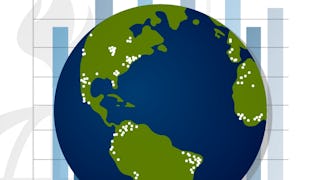- Browse
- Environmental Economics
Environmental Economics Courses Online
Explore environmental economics for analyzing economic policies and their environmental effects. Learn about cost-benefit analysis and sustainable development.
Explore the Environmental Economics Course Catalog
 Status: PreviewPreviewP
Status: PreviewPreviewPPolitecnico di Milano
Skills you'll gain: Water Sustainability, Water Resource Management, Environmental Engineering, Water Quality, Civil Engineering, Sustainable Engineering, Energy and Utilities, Sustainable Technologies, Climate Change Adaptation, Environment and Resource Management, Biotechnology
4.7·Rating, 4.7 out of 5 stars51 reviewsBeginner · Course · 1 - 4 Weeks
 Status: FreeFreeL
Status: FreeFreeLLudwig-Maximilians-Universität München (LMU)
Skills you'll gain: Game Theory, Business Strategy, Strategic Thinking, Competitive Analysis, Strategic Partnership, Product Strategy, Strategic Decision-Making, Market Opportunities, Go To Market Strategy, Market Dynamics, New Product Development, Market Analysis, Product Design, Innovation
4.8·Rating, 4.8 out of 5 stars499 reviewsMixed · Course · 1 - 3 Months
 Status: PreviewPreviewP
Status: PreviewPreviewPPontificia Universidad Católica de Chile
Skills you'll gain: Climate Change Mitigation, Energy and Utilities, Sustainable Technologies, Sustainable Development, Systems Of Measurement, Physics, Climate Change Adaptation, Environmental Policy, Electric Power Systems, Environmental Science, Mathematical Modeling
4.8·Rating, 4.8 out of 5 stars729 reviewsBeginner · Course · 1 - 4 Weeks
 Status: PreviewPreviewJ
Status: PreviewPreviewJJohns Hopkins University
Skills you'll gain: Epidemiology, Community Health, Biostatistics, Public Health, Community Outreach, Social Determinants Of Health, Health Assessment, Environmental Monitoring, Investigation, Data Collection, Persuasive Communication
4.7·Rating, 4.7 out of 5 stars318 reviewsBeginner · Course · 1 - 3 Months
 Status: Free TrialFree TrialF
Status: Free TrialFree TrialFFundação Instituto de Administração
Skills you'll gain: International Relations, Tax, Export Control, Global Marketing, Economics, Tax Compliance, Market Opportunities, Market Research, Culture, Business Strategy
4.8·Rating, 4.8 out of 5 stars53 reviewsBeginner · Course · 1 - 4 Weeks
 Status: PreviewPreviewY
Status: PreviewPreviewYYale University
Skills you'll gain: Environmental Science, Environment, Social Justice, Culture, Sustainable Development, Anthropology, World History, Intercultural Competence, Ethical Standards And Conduct, Cultural Diversity, Climate Change Mitigation
4.8·Rating, 4.8 out of 5 stars62 reviewsBeginner · Course · 1 - 3 Months
 Status: PreviewPreviewU
Status: PreviewPreviewUUniversity of Geneva
Skills you'll gain: Water Resource Management, Water Sustainability, Natural Resource Management, Environmental Resource Management, Environmental Policy, Governance, Conflict Management, Environmental Laws, International Relations, Policy Analysis, Case Studies
4.6·Rating, 4.6 out of 5 stars247 reviewsMixed · Course · 1 - 3 Months
 Status: PreviewPreviewU
Status: PreviewPreviewUUniversity of Maryland, College Park
Skills you'll gain: Fire And Life Safety, Safety Standards, Accident Prevention, Hazard Analysis, Environmental Issue, Environmental Science, Building Design, Risk Management, Property Maintenance, Emergency Response
4.7·Rating, 4.7 out of 5 stars575 reviewsMixed · Course · 1 - 3 Months
 Status: PreviewPreviewE
Status: PreviewPreviewEEmory University
Skills you'll gain: Substance Abuse, Public Health, Conflict Management, International Relations, Cultural Diversity, Mental and Behavioral Health, Social Sciences, Economics, Policy, and Social Studies, Media and Communications, Child Welfare
4.6·Rating, 4.6 out of 5 stars291 reviewsBeginner · Course · 1 - 3 Months
 Status: Free TrialFree TrialU
Status: Free TrialFree TrialUUniversity of Illinois Urbana-Champaign
Skills you'll gain: 3D Modeling, Emerging Technologies, Manufacturing Processes, Computer-Aided Design, Industrial Design, Prototyping, Materials science, Business Economics, Product Development, Innovation, New Product Development
4.7·Rating, 4.7 out of 5 stars1.7K reviewsBeginner · Course · 1 - 4 Weeks
 Status: PreviewPreviewS
Status: PreviewPreviewSSapienza University of Rome
Skills you'll gain: Financial Systems, Financial Data, Financial Market, International Finance, Finance, Accounting, Banking, Economics, Financial Analysis, Microsoft Excel, Spreadsheet Software, Data Analysis
4.4·Rating, 4.4 out of 5 stars11 reviewsIntermediate · Course · 1 - 3 Months
 Status: PreviewPreviewY
Status: PreviewPreviewYYonsei University
Skills you'll gain: Sociology, Social Sciences, Social Justice, Socioeconomics, Cultural Diversity, International Relations, World History, Demography, Economics
4.8·Rating, 4.8 out of 5 stars319 reviewsBeginner · Course · 1 - 3 Months
Environmental Economics learners also search
In summary, here are 10 of our most popular environmental economics courses
- New paradigms in wastewater management: Politecnico di Milano
- 竞争策略(中文版): Ludwig-Maximilians-Universität München (LMU)
- Explorando la Energía Sustentable: Pontificia Universidad Católica de Chile
- Disease Clusters: Johns Hopkins University
- Relações Internacionais: Fundação Instituto de Administração
- Introduction to Religions & Ecology: Yale University
- Gestion et Politique de l'eau : University of Geneva
- The Effect of Fires on People, Property and the Environment: University of Maryland, College Park
- Understanding Violence: Emory University
- The 3D Printing Revolution: University of Illinois Urbana-Champaign










